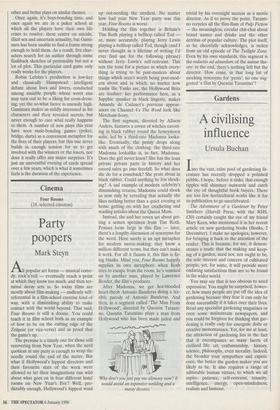Cinema
Four Rooms
(18, selected cinemas)
Party poopers
Mark Steyn
Al popular art forms — musical come- dy, rock'n'roll — eventually reach a point at which they know too much, and then ter- minal decay sets in. So today films are mostly about film-making — endlessly self- referential in a film-school exercise kind of way, with a diminishing ability to make contact with the world beyond. That said, Four Rooms is still a doozie. You could teach it in film school both as an example of how to be on the cutting edge of the Zeitgeist (or vice-versa) and as proof that the game's up.
The premise is a timely one for those still recovering from New Year, when the nerd quotient at any party is enough to wrap the needle round the end of the meter. But what if Hollywood's hippest directors and their favourite stars of the week were allowed to let their imaginations run wild about what goes on in four different hotel rooms on New Year's Eve? Well, pre- dictably enough, Hollywood's hippest wind up out-nerding the nerdiest. No matter how bad your New Year party was this year, Four Rooms is worse.
Holding the film together is Britain's Tim Roth playing a bellhop called Ted or, more accurately, playing Jerry Lewis playing a bellhop called Ted, though (and I never thought in a lifetime of writing I'd ever find use for the following phrase) without Jerry Lewis's self-restraint. This sets the tone for a picture in which every- thing is trying to be post-modern about things which aren't worth being post-mod- ern about and in which, no matter how trashy the Yanks are, the Hollywood Brits are trashier: her performance here, as a Sapphic spanker in black lingerie, makes Amanda de Cadanet's previous appear- ances on Channel 4's The Word look like Merchant-Ivory.
The first segment, directed by Allison Anders, features a coven of witches cavort- ing in black rubber round the honeymoon suite, led by a third-rate Madonna looka- like. Eventually, the penny drops along with much of the clothing: the third-rate Madonna lookalike is, in fact, Madonna. Does the girl never learn? She has the least private private parts in history and her record sales go into freefall. So what does she do for a comeback? She prats about in black rubber. Could anything be less shock- ing? A sad example of modern celebrity's diminishing returns, Madonna could shock us now only by revealing that actually she likes nothing better than a quiet evening at home getting on with her crocheting and reading articles about the Queen Mum.
Instead, she and her coven set about get- ting a semen specimen from Tim Roth. Penises loom large in this film — later, there's a lengthy discussion of synonyms for the word. Here surely is an apt metaphor for modern movie-making: they know a million different terms, but they can't make it work. For all it flaunts it, this film is fir- ing blanks. Mind you, Four Rooms happily supplies its own metaphors: when Roth tries to escape from the room, he's vomited on by another man, played by Lawrence Bender, the film's producer.
After Madonna, we get hot-blooded heart-throb Antonio Banderas doing a ter- rible parody of Antonio Banderas. And then, in a segment called 'The Man From Hollywood', directed by Quentin Taranti- no, Quentin Tarantino plays a man from Hollywood who has been made jaded and `Why don't you just pay me alimony now? It would avoid an expensive wedding and a messy divorce.' trivial by his overnight success as a movie director. As if to prove the point, Taranti- no recycles all the flim-flam of Pulp Fiction — the meaningless, circular chit-chat about brand names and drinks and the other detritus of popular culture. The plot itself, as he cheerfully acknowledges, is stolen from an old episode of The Twilight Zone. Even by his own standards, this segment is the reductio ad absurdum of the auteur the- ory: in the end, there's nothing left but the director. How come, in that long list of mocking synonyms for 'penis', no one sug- gested 'a film by Quentin Tarantino'?


















































 Previous page
Previous page